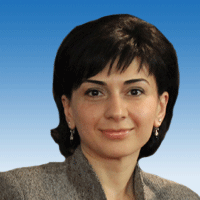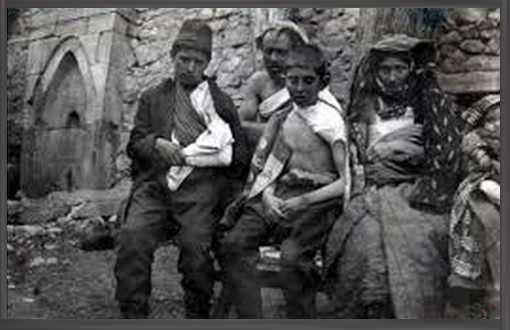
Tells Naira Sargis Mkrtchyan, YSU Professor, Orientalist
Vronika Gaspar Berberyan (1907-1999)
I will present the story of my fraternal Grandmother Veronika Gaspar Berberyan. Her family was able to run away first to Nakhijevan, and then moved to Yerevan. I have heard her stories since childhood. She used to say, “When you ask me questions my reminiscences undo and open like a ball of wool.”
My Grandmother Veron told in detail how they lived in Boğazlıyan, today's Turkey, what their family was like. My Grandmother Veron also told how Armenians were slayed; how they sheltered about 40 people in their house as gendarmes had no right to touch our family at the governor's order.
My Grandmother told her stories and the stories of her relatives, neighbors for everyone eager to listen. She told in detail, in sweet Western Armenian. The story usually started like this:
''Our family lived in Boğazlıyan, Yozgat province, Anatolia. Our neighborhood was called Kilse Mahal, i.e. the Church quarter. My Grandfather Priest Hakob was senior priest of St. Astvatsatsin [, tr.]. I had two uncles – Harutyun (he was 20 in 1915) and Khacher (he was 15).
We lived well and were engaged in farming. One day, when my Father was a soldier in the Turkish army, my Grandmother, the Pastor’s wife, had a dream as if my Father brought so many skulls and bones and filled the liukliki (a niche where bedding was shelved) with them. Granny asked, “Gaspar, why have brought and put these here?” my Father answered, “One day a museum will be built, all this will be put there for the world to see.”
And after this dream it started… Men were amassed from fields, homes, shops saying it was war and everybody had to go to the army. Then all the guns, knives were collected and taken away from houses…
Suddenly my Uncle (Father’s brother) rushed in breathless, hitting his head over the walls, “They scraped a twenty-ghurush-worth (small change) bullet, they slaughtered everybody with axes.” We hid my Uncle. For fifty days males were searched for to murder. After that we dug some place from the barn in the direction of the yard for my Uncle to hide during the day. At night we let him out to breathe a little.
Then, in March 1916 the kaymakam ordered, “Not a single kilo of an Armenian’s meat should be spared, all Armenians must be slaughtered.”
… My Uncle, Harutyun Berberyan, had taken out a stone from the wall of our house and crawled into it and hidden. None of the gendarmes that came could find him.
My Granny, the Pastor’s wife, who had hidden Uncle Harutyun, one day went to hazarapet [governor, tr.] Selami Bek who was married to an Armenian we knew and said to hazarapet, “Selami Bek, Harutyun is at home, what is going to happen?” Hazarapet Selami Bek pulled a button off his uniform and said, “When I send this button with a gendarme, let Harutyun come.” In the morning a gendarme came, knocked at the door and said, “Let Harutyun come to Kaymakam with his instruments of a 47
barber.” My Uncle Harutyun took his barber instruments and went with the gendarme. At that very moment a Turk barber was shaving kaymakam. He put his razor to kaymakam’s face and it started to bleed. Salami Bek said to the Kaymakam, “Let Harutyun shave you.” Uncle Harutyun took his tools and solemnly shaved Kaymakam clearly. He left the building to get home and saw that whole families were being driven to exile, tied to each other. The Kaymakam ordered, “Let a gendarme take Harutyun home.” Harutyun came home. He was twenty then but looked eighty. Uncle Harutyun saw no way out and said, “I won’t trust the Turks any longer.” He mixed poppy oil with blue copper sulfate and said, “I’ll give this to my wife, then I’ll drink some. You may do whatever you want.” Uncle Harutyun gave the poison to his wife. Just three minutes later the family received an amnesty. Twenty five people got free thanks to my Uncle’s sayiyen. Uncle immediately mixed fifteen egg yolks and made his wife drink it. His wife vomited, came to and survived.
Our family was very big. Many members of our family served the Turkish government and were officials. For example, my Father was a translator; Karapet Aga’s elder brother was a lawyer.
… In 1918 the massacre had stopped already. There was a truce. Turks had come and filled Armenians’ houses. One day some Turkish women came, knocked at our door and asked for water. My Mother told me, “Veronika jan [jan is a tender word, tr.], bring some water.” One of those women in hijab came up to my Mom and secretly said, “Mayrik, [Mother, in Armenian], you are Armenians, for the sake of Armenians, save me from them. My name is Annik. I was kidnapped.” Mom said, “You go today, I will talk to my brother-in-law and see what we can do.” Her brother-in-law came home in the evening. Mother told him everything. He said, “Let us send a child to bring Annik here.” We sent ten-year-old Hakob. He went and brought Annik. The Turks saw Annik was missing. They came, rushed into our house and said, “Give our girl to us.” My Grandmother shouted. A gendarme, who was passing by, came in. My Granny said, “These Turks have come and want some girl. We have no idea.” The gendarme drove the Turkish women out of our house and Annik stayed with us. She was rescued, in the end we sent Annik to an orphanage. From there orphans were taken to Beirut. In a word, Annik remained an Armenian.
I can still remember, it was the third day of manslaughter. Wearing a Turkish hijab my Mother went to her mother’s place with my four-year-old sister. While mother and daughter were talking carts were brought; shouting and screaming filled outside. People were driven to exile. Mother said, “I won’t live here.” A gendarme said, “Go home by the road near the market.” Mother got confused and lost my younger sister. Mother was hardly able to get home. Then we saw my younger sister, who had managed to find the way and get home alone. We were happy to find each other. But my Mom told how Grandmother was taken away in a cart. I ran out and rushed to Grandmother’s house. I found the doors open and the house empty. Thus my Granny remained alone in exile. Actually gendarmes had come and slaughtered her. There was an Anna of Sardala. She got under corpses and remained breathless. When gendarmes went away Anna crawled out very cautiously and came to our village, but she was swollen and inflated, naked. Not even a handkerchief was left for her to cover her shame. Turkish brats saw her and shouted, “Oh, devil is here!” and ran away in fear. Anna came to her house. She saw the door open. She had given her only son to her Turkish neighbor and she went to that man. The Turk killed a sheep at home, took the skin, wrapped Anna in it, and healed Anna’s wounds.
… After the ceasefire of 1924, when Kemal Atatürk came to lead the government, the Armenians complained saying, “Turks damaged us a lot, they slaughtered our relatives”. Then the court trial followed: a lot of Turkish officials were punished.
There was an Armenian girl in a Turk’s house. That man and his wife kept the Armenian girl to marry their son but the girl was in love with my Uncle Khacher. One day she let us know that she wanted to marry Khacher. Armenians sent a telegram saying that the girl’s uncle called her from a faraway country. The girl ran away from the Turk’s house and came to us. The Turk who had kept that girl for his son said, “I wiped her nose. How could she betray us?” Their son graduated from officers’ school and came to our house. He asked, begged. My Uncle thought some trouble might happen, the girl could be kidnapped again and told Yeprem the coachman, “At night feed your horses well. Take our sister-in law to Kayseri.” We put a chador over her head and sent to Kayseri. But that Turk applied to the Turkish government and asked to find his fiancée. However, there was a Turkish centurion whose wife was Armenian. She went and told that the Armenian girl had already married an Armenian husband; she was pregnant and was almost to give birth. This is how those Turks became enemies with us. That one came to our house and said, “You have two hours to leave your house.” So we had to leave our house. We went to a Turk’s house that treated us well. That Turk took us in, fed us. In 1924 we moved to Polis. We stayed in the refugee camp of Polis for a year. Then a ship came from Russia and took the seven of us to Batumi. There were no men with us. We came to Batumi. Poverty ruled everywhere. My Uncle came to meet us. We took a train, the train ran on fuel oil. We were put off at Davallu station, under tents; some bread was distributed. My Uncle took us to Nakhijevan, to my Father. We lived together for some one and a half years; my Father died. Then we moved to Yerevan…”
* This story was published also in The Khariskh [Anchor, tr.] magazine, March/April, 2005, under the title “The Fresh Oak Offchoot”.
* Under the headline "100 years... Real Stories" Information, Analytical Agency "Armedia" presents real stories from the lives of the Genocide survivors (the stories are told by the survivors’ descendants, relatives, close people) collated by "European Integration" Non-Governmental Organization within the project "The Turk Who Saved My Life". The stories are special as the hero/heroes fled the claws of the Great Genocide through the direct or indirect assistance of a Turk/Turks (a neighbor, well-wisher, friend or witness of the event).The project is implemented with the assistance of the United Kingdom Foreign and Commonwealth Office. The presented materials, opinions and conclusions introduce the views of the authors and participants and do not reflect the position of the United Kingdom Government.
* Click here to read the article in Turkish.
Other pieces in the series:
* Aris Nalcı talks about "The Turk Who Saved Me" Project: Story Project Aims to Face the Genocide Without Prejudice
* “A Fragment from My Grandmother’s Nostalgia Remained in Us”
* "Run, Go, Keep My Light Burning"
* "What Was the Fault of the Poor Armenian Nation..."
* "Two Offshoot Survivors of Exterminated Dynasties Vowed to Weave Together and Become a Thick Oak"





.jpg)